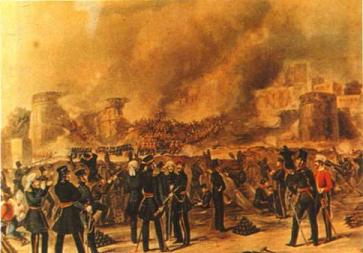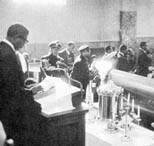
February 21

1431 In a trial demanded by the English and staged by the Burgundians, French heroine Joan of Arc is accused of heresy before the judges in Rouen. "...After three weeks of cross examination, Cauchon began to worry about his lack of evidence against Joan. She did not confess to any wrongdoing. She seemed honest in her testimony. Cauchon needed a few tricks to accomplish his ultimate objective: Joan of Arc's death by burning at the stake. After pouring through the lengthy transcript of Joan's answers, Cauchon and his helpers fashioned twelve separate charges against her. Cauchon claimed that those charges were based on answers from Joan's own mouth. That was proven - 25 years later - to be untrue. Joan, who could neither read nor write, could only respond to questions that were verbally put to her. One can only imagine the enormous strain on this young woman of nineteen. After all the evidence was presented against her, Joan was asked to sign a "statement of faults." We would call that a "confession." Exhausted, ill and threatened with torture, Joan stood firm..."

1849 Britain wins the Second Sikh War. "...which resulted in the abrogation of the Sikh kingdom of the Punjab, was virtually a campaign by the victors of the first Anglo-Sikh war (1945-46) and since then the de facto rulers of the State finally to overcome the resistance of some of the sardars who chafed at the defeat in the earlier war which, they believed, had been lost owing to the treachery on the part of the commanders at the top and not to any lack of fighting strength of the Sikh army. It marked also the fulfillment of the imperialist ambition of the new governor-general, Lord Dalhousie, to carry forward the British flag up to the natural boundary of India on the northwest. According to the peace settlement of March 1846, at the end of Anglo-Sikh war I, the British force in Lahore was to be withdrawn at the end of the year, but a severer treaty was imposed on the Sikhs before the expiry of that date..."
1858 The first electric burglar alarm is installed by Edwin T. Holmes of Boston, Massachesetts.

1885 The Washington Monument, built in honour of America's revolutionary hero and first president, is dedicated in Washington, DC. The 555-foot-high marble obelisk was first proposed in 1783, and Pierre L'Enfant left room for it in his designs for the new US capital. After George Washington's death in 1799, plans for a memorial for the "father of the country" were discussed, but none were adopted until 1832, the centennial of Washington's birth. Architect Robert Mills' hollow Egyptian obelisk design was accepted for the monument, and on 4 July 1848, the cornerstone was laid. Work on the project was interrupted by political quarreling in the 1850s, and construction ceased entirely during the American Civil War. Finally, in 1876, Congress, inspired by the American centennial, passed legislation appropriating $200,000 for completion of the monument. In February 1885, the Washington Monument is formally dedicated, and three years later it will opened to the public, who are permitted to climb to the top of the monument by stairs or elevator. The monument was the tallest structure in the world when completed and remains today, by District of Columbia law, the tallest building in the nation's capital. (Bradley)

1916 WW1: Following an enormous bombardment, the crown prince's German Fifth Army attacks the fortified but lightly garrisoned area around Verdun. The assault gains considerable territory, capturing a key position, Fort Douaumont. Joffre prohibits any further retreat and sends Gen. Henri Philippe Petain with reinforcements to defend the region.

1919 Weimar: Kurt Eisner, the Socialist Prime Minister of Bavaria, is assassinated. "...an aspiring law student named Anton, Count von Arco-Valley, confronted the revolutionary leader Kurt Eisner on the street in Munich and shot him dead. Munich was then in the grip of a socialist revolutionary government which had largely been organized by Eisner, a Jewish theater critic and journalist from Berlin, who had been in prison for inciting anti-war sentiments and strikes during The Great War. The assassination unleashed a storm of violence in the Bavarian capital...ironically, a draft resignation document was discovered in Eisner's pocket. The assassination had been completely pointless. Political turmoil engulfed Bavaria over the next weeks and months, and when news of a communist revolution in Hungary reached Munich, organized Communists under the Russian Bolsheviks Max Levien and Eugen Levine' pushed aside the Socialists and anarchists and declared a Bolshevik regime..."
1924 Birth: Robert Mugabe, president of Zimbabwe.
1933 The German Union of Red Fighters exhorts the Young Proletarians to disarm the SA and SS.
1939 Holocaust: German Jews are ordered to surrender all gold and silver, except wedding rings.
1940 Holocaust: Work begins on the German concentration camp at Auschwitz. (WWIIDBD)
1941 WW2: Soviet Foreign Minister Maxim Litvinov, the former ambassador to the US, is dismissed from the Central Committee.

1941 WW2: Franco confers with Mussolini in Bordighierra, then meets Pétain in Montpellier.
1944 Diary of Leon Gladun: We're nearing port. We've sailed 1,600 nautical miles--you can say we've covered quite the road. It's 19:45 hours; in some half an hour we'll be docking. It's no longer warm: you can feel the difference as it's not too warm even in a jacket. After all it's the end of February and at home in Poland it's bone-chilling cold.
1952 Identity Cards are abolished in Britain.
1960 Fidel Castro nationalises all American owned businesses in Cuba.

1965 Death: American Black Moslem Leader Malcolm X; shot dead while addressing a meeting in New York.

1972 Luna 20 makes a soft landing in the Mare Fecunditatis region of the Moon. Lunar sample will be returned to Earth on 25 Feb.

1972 US President Richard M. Nixon arrives in Beijing, the capital of the People's Republic of China, on the first presidential visit to the world's most populous nation. As the federal government had formally opposed China's Communist government since it took power in 1949, Nixon is also the first president to visit a nation not recognised by the United States. In Beijing, President Nixon meets with Chairman Mao Zedong and Premier Zhou Enlai. At the Shanghai Communique on 27 February, Nixon and the Chinese premier will agree to lessen the risk of war, expand cultural contacts between the two nations, and establish a permanent US trade mission in China. In addition, the US acknowledges China's 'One China' policy and agrees to a gradual withdrawal of US troops from the island of Taiwan as tensions decrease. The two leaders also secretly discusse ways in which they might cooperate to check the growth of Soviet power in Asia and elsewhere. (Bradley)
1988 The grave of Boadicea, the warrior queen who fought the Romans almost 2000 years ago, is discovered under a platform at Kings Cross station, London.

2000 Ralph Nader announces his candidacy for the Green Party's Nomination for President. "...I have a personal distaste for the trappings of modern politics, in which incumbents and candidates daily extol their own inflated virtues, paint complex issues with trivial brush strokes, and propose plans quickly generated by campaign consultants. But I can no longer stomach the systemic political decay that has weakened our democracy. I can no longer watch people dedicate themselves to improving their country while their government leaders turn their backs, or worse, actively block fair treatment for citizens. It is necessary to launch a sustained effort to wrest control of our democracy from the corporate government and restore it to the political government under the control of citizens. This campaign will challenge all Americans who are concerned with systemic imbalances of power and the undermining of our democracy, whether they consider themselves progressives, liberals, conservatives, or others. Presidential elections should be a time for deep discussions among the citizenry regarding the down-to-earth problems and injustices that are not addressed because of the gross power mismatch between the narrow vested interests and the public or common good..."
2002 The CIA warns that Afghanistan could descend into violent chaos once again if its rival warlords and ethnic rivalries are not restrained.
2002

2003

2004

2005

2005

2005

2005

2005

2005

2005

2005

Visit:




 Visit:
Visit:

Click Here to email the History: One Day At a Time webmaster.